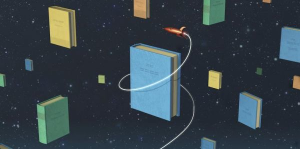“What we find when we’re not looking”
Unintentional Knowledge: What we find when we’re not looking – this is an eloquent plea for balance between digital and traditional library-based research. While fully supporting the capabilities offered by online search technology the author also highlights the value of what a person can find by browsing library stacks, the unintentional knowledge of the article’s title.
Today we applaud students not for exploring the stacks but for being efficient, making research quick and easy. …
If we think of education as the gaining of intentional knowledge, then yes: The students had a question, and they found an answer. Search engines lend themselves well to the learning of that kind of knowledge.
But as the late philosopher Michael Polanyi and others have argued, most of the knowledge we possess is not conscious and intentional; it is incidental, or tacit, acquired as a byproduct of performing some other activity. Practically all the knowledge we acquire as children up to the time we start school is incidental, but the process does not end there. Incidental knowledge continues to play an important role in our adult lives. The library stacks are a mine of incidental knowledge.
Not only do digital and library-based research differ in results, but they have implications for library design.
… modern library design mirrors student preferences. Increasingly, libraries are social spaces—with Wi-Fi, study nooks, coffee shops, chat areas, and movable furniture—and not homes for books, which are relegated to off-site repositories, save for a few recent acquisitions. If a student wants a book, she can requisition it. I cannot imagine students already deterred by the stacks having much patience for the repository.
The author, Julio Alves, is director of the Jacobson Center for Writing, Teaching and Learning and of the Writing Program at Smith College and fills this brief but heart-felt article with examples to back up arguments.
Saw this on the Special Libraries Association LinkedIn discussion group.

